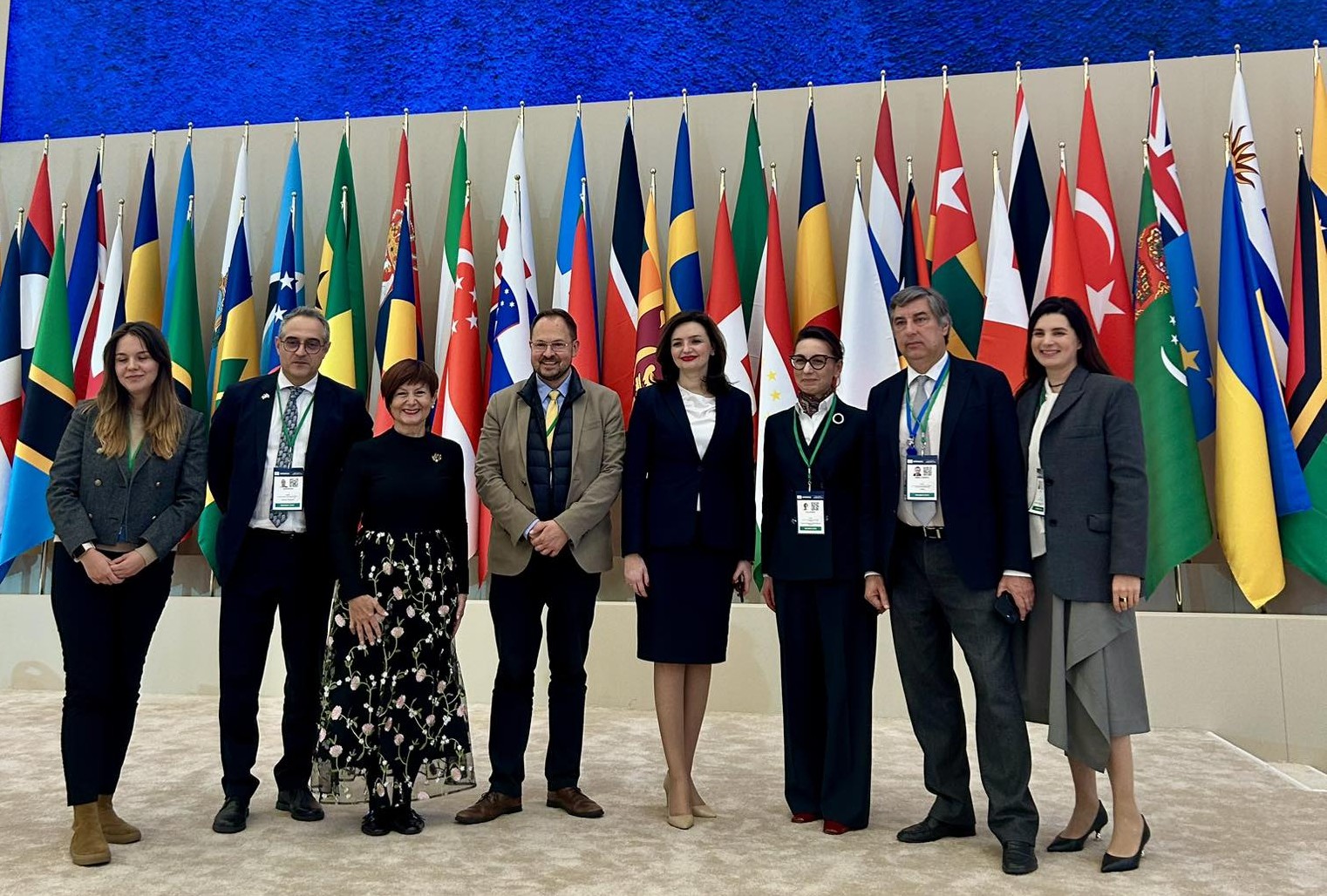
Moldova joins UNESCO Executive Board for the first time; Moldovan culture minister describes move as great responsibility, opportunity to promote country's values
Moldova has been elected, for the first time in its history, as a member of the UNESCO Executive Board for the 2025-2029 mandate, during the 43rd session of the organization's General Conference, held in Samarkand. ‘’This is a great responsibility, but also an opportunity to promote our values and traditions,’’ said Culture Minister.
‘’Internally, we have advanced together with the UNESCO Commission from Moldova, in order to include the wineries Cricova" and Milestii Mici in the indicative list of UNESCO World Heritage. Alongside our partners from Romania and Ukraine, we are currently working on the Cobza and Cucuteni-Tripylla files. We continue to do good things for Moldova,’’ said the minister of culture.
Among the 27 states entering the new composition of the Executive Board, Moldova was designated from the regional group alongside Romania and Ukraine, after a competition with four candidate states. The mandate gives the country the opportunity to strengthen its presence and influence in the fields of education, culture and science, actively contributing to the global strategic projects and directions of UNESCO.
In recent years, Moldova has strengthened its collaboration with UNESCO by promoting elements of cultural and historical heritage in the representative lists of the organization, developing projects in creative industries, elaborating the National Strategy for the Development of Culture and Cultural Heritage 2035, and implementing important indicators and programmes.
Moldova – Traditions and Values Recognized Internationally by UNESCO
In recent years, Moldova has consolidated its presence on the international cultural stage by promoting its values and traditions within UNESCO. Remarkable achievements include the inclusion of intangible cultural heritage elements on UNESCO's Representative List, such as "Colindatul de ceată bărbătească," (Caroling of men’s groups), a Christmas-specific caroling ritual, or Cultural Practices Associated with March 1st (Mărțișorul), which reflects the continuity of traditions and the connection between generations. At the same time, traditional ways of creating woolen carpets, shared with communities of Romania, have been recognized for their cultural and craftsmanship value.
Besides intangible heritage, Moldova actively participates in preserving cultural and natural heritage. The Struve Geodetic Arc, partially located on its territory, is inscribed on the UNESCO World Heritage List, while the Orheiul Vechi (Old Orhei) Cultural and Natural Reserve and the chernozem zones of the Balti Steppe are included in the UNESCO Tentative List, highlighting the country's commitment to protecting the environment and historical heritage.
The values promoted by Moldova in these endeavors are numerous: cultural identity, respect for heritage, continuity of traditions, community and cultural diversity. Also, the country actively participates in UNESCO international conferences and supports cultural policies as a pillar of sustainable development, asserting that ‘’there is no future without culture.’’ The National Strategy for the Development of Culture and Cultural Heritage 2035 shows this commitment, emphasizing education, science, communication and cultural pluralism.
Thus, Moldova not only protects and promotes its national values, but also actively contributes to international cultural dialogue, strengthening its recognition within UNESCO and opening new opportunities for global cooperation.
Moldova accelerates digital transformation in culture with UN support
Registrations start for Eurovision Moldova 2026; Moldova 1 TV station launches National Selection
PHOTO GALLERY // Double launch at Ethnography Museum: ''House chamber for guests and feasts. Palliative cares''
PHOTO GALLERY // Interactive encyclopedia 'Pop-Up Space' launched at Ion Creanga National Children's Library of Moldova
Chisinau initiates denunciation of Russian Cultural Centers Agreement
Moldova denounces Cultural Agreement with Russian Federation
BTA: Hristo Botev monument unveiled in Moldovan village of Corten
Moldova returns to Eurovision Song Contest 2026 with new national selection format
PHOTO GALLERY // Doina and Ion Aldea-Teodorovici commemorated in Chisinau
PHOTO // Ceremony marking 105 years since foundation of Romanian Writers' Society of Bessarabia, predecessor of Writers' Union of Moldova, held in Chisinau
PHOTO GALLERY // Inauguration of exhibition 'Right Angle' by fine artist Iurie Cojocaru
Moldovan parliament speaker offers condolences following death of well-known guitarist
Moldovan president conveys message of condolence after passing away of well-known guitar player
National Prize 2025 // Ten personalities, group of researchers rewarded for excellence in culture, science, sports in Moldova
Prime Minister in discussions with Ambassadors of the Republic of Moldova
Funding of forensic expertise ordered in criminal and contraventional cases to be covered by budgets of public forensic institutions
Moldova to have new ambassadors to Romania, Ukraine, France, China
Anti-corruption prosecutor of Moldova passes external evaluation
Deputy Prime Minister for Reintegration: Issue of supplying Transnistrian region with natural gas has technical component and is not of political nature
Government creates new services and approves amendments to enhance social protection for children, families, vulnerable groups
New type of driving license to be issued to Moldovan citizens
Spatial data to be centralized and digitized
PHOTO // Prime Minister at ambassadors' meeting: Diplomacy must build necessary bridges for Moldova to confidently join European family
Moldovan President meets Romanian Minister of Foreign Affairs
Public service obligation for Energocom extended by late 2026 to ensure electricity supply security
PHOTO // New driving license model to be issued in Moldova
Daniel Rotaru appointed as State Secretary of Government
TOP 5 achievements in agriculture: farmer financing, record investments and decisive steps towards EU
EcoContact sets up guide containing behavior rules in protected natural areas of Moldova
Government investigates Lukoil investments at Chișinău Airport

